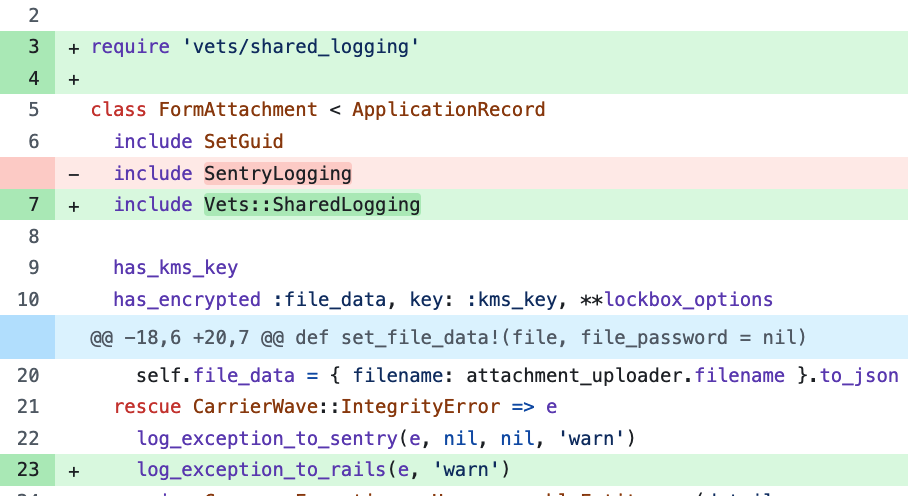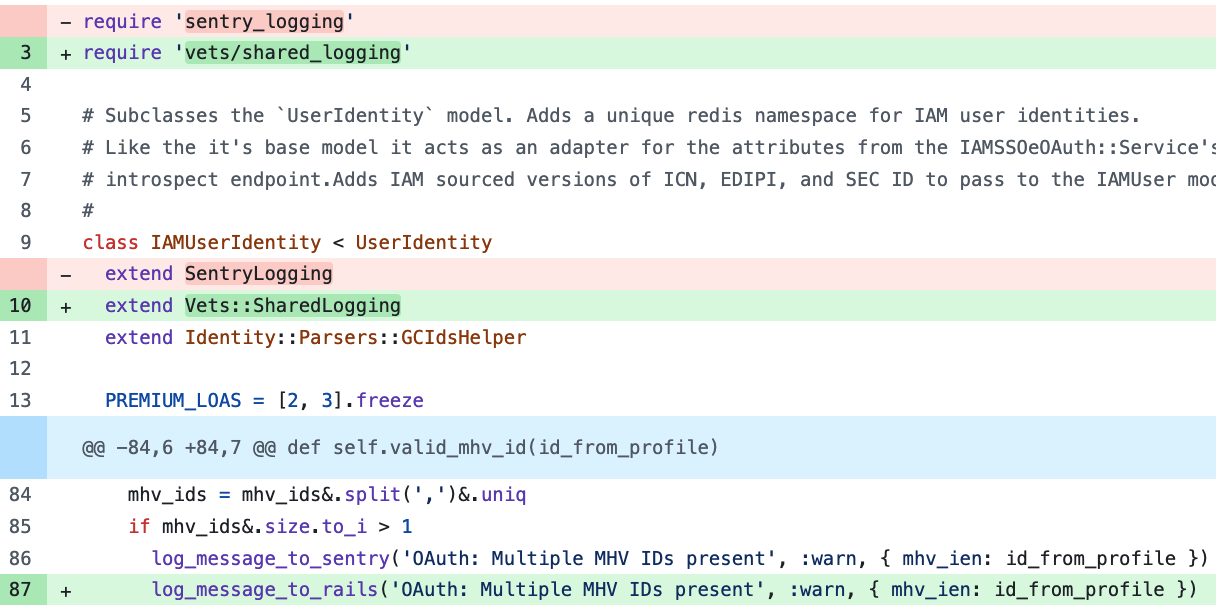How to Migrate from SentryLogging to Vets::SharedLogging
Last Updated:
This guide walks through migrating logging implementation from the deprecated SentryLogging module to the new Vets::SharedLogging module in Vets API. After completing this migration, you'll be able to control whether your logs go to Sentry, Rails, or both, and your code will be compatible with the eventual removal of SentryLogging.
Before you begin
Before starting this migration, ensure you:
Have reviewed the SharedLogging introduction PR #21130 to see how
Vets::SharedLoggingwas implemented.Can test your changes in a development environment
Step-by-step guide
Step 1: Choose your logging strategy
Decide how you want to handle logging going forward. Sentry will be deprecated in the future (although there’s no date, yet), so we recommend moving away from Sentry logging. There are three options:
Option A: Log to Rails only
Use
Vets::SharedLogging’slog_message_to_railsandlog_exception_to_railsOr, use
Rails.logger. See Rails docs for more info.Remove any Sentry logging calls
Option B: Log to both Sentry and Rails (most similar to old SentryLogging behavior)
Use
log_message_to_sentryfor SentryAdd
log_message_to_railsfor Rails logging
Option C: Log to Sentry only (Not Recommended)
Use only
log_message_to_sentryandlog_exception_to_sentry
Step 2: Identify all uses of SentryLogging in your code
Search vets-api to find all instances where SentryLogging is being used in files owned by your team. Grep command for your convenience:
grep -r "include SentryLogging\|extend SentryLogging\|SentryLogging\." .
Step 3: Update module includes and requires & logging method calls
Replace SentryLogging references with Vets::SharedLogging in each file identified in Step 2.
For instance methods (using include):
Add the require statement at the top of your file
Replace
include SentryLoggingwithinclude Vets::SharedLogging
Example of an instance method using both Sentry and Rails logging:

For class methods (using extend):
Add the require statement at the top of your file
Replace
extend SentryLoggingwithextend Vets::SharedLogging
Example of a class method using both Sentry and Rails logging:

Update your logging calls. See the following examples for message and exception logging:
New SharedLogging Option A (Rails only):
log_message_to_rails("User login failed", :error, { user_id: 123 })
log_exception_to_rails(exception, :error)
# Or use the Rails Logger class
Rails.logger.warn('Service tag missing', class: self.class.name)
Rails.logger.error('[SignIn][AudienceValidator] Invalid audience')New SharedLogging Option B (both Sentry and Rails):
log_message_to_sentry("User login failed", :error, { user_id: 123 }, { action: "login" })
log_message_to_rails("User login failed", :error, { user_id: 123 })
log_exception_to_sentry(exception, { context: "api_call" }, { service: "external" }, :error)
log_exception_to_rails(exception, :error)New SharedLogging Option C (Sentry only):
log_message_to_sentry("User login failed", :error, { user_id: 123 }, { action: "login" })
log_exception_to_sentry(exception, { context: "api_call" }, { service: "external" }, :error)Step 4: Test your changes
Verify that your logging is working correctly in your development environment.
Run your application locally
Trigger the code paths that contain logging
Check that logs appear in the expected locations:
For Rails logs: Check
log/development.log
Run your test suite to ensure no breaking changes.
Step 5: Deploy and monitor
After testing locally:
Merge your PR so your changes deploy to the staging environment
Monitor logs to ensure they're appearing correctly
The deprecation warning (
WARNING: This module is deprecated, and will be removed in October 2025. Please use Vets::SharedLogging instead.) should not be in your logs anymore.For Sentry: Check Sentry in staging
Check DataDog for logs
Key Differences from SentryLogging
Rails logging is explicit - You must call separate methods for Rails logging
Tags context - Only available for Sentry methods (
log_*_to_sentry); exampleException handling - Rails exception logging is simplified (no extra context parameter)
Next steps
Update any team documentation to reflect your chosen logging strategy
If you chose the option to log to Sentry only, please reach out to #platform-cop-backend and let us know your use case. As we move further from Sentry in favor of Datadog, we want to know any use cases for preferring Sentry so we can try to accommodate those in Datadog.
Extras
If you’d like, copy the Markdown below and use in a user story or your pull request.
## User Story
As an engineer working in vets-api, I want to replace `SentryLogging` in anticipation of its deprecation in Oct 2025.
## Tasks
- [ ] Review an example migration PR https://github.com/department-of-veterans-affairs/vets-api/pull/23059
- [ ] Choose logging strategy (Rails only, Sentry & Rails, or Sentry only–not recommended)
- [ ] Identify all team-owned files using `SentryLogging`
- [ ] Update all `SentryLogging` to `Vets::SharedLogging`
- [ ] Test locally
- [ ] PR reviewed and merged
- [ ] Test in staging environment
- [ ] Update team documentation (if needed)Need help?
If you encounter issues during migration:
Review the SharedLogging source code
Check existing implementations using
grep -r "Vets::SharedLogging" .Reach out in the
#vfs-platform-supportSlack channel
Help and feedback
Get help from the Platform Support Team in Slack.
Submit a feature idea to the Platform.
